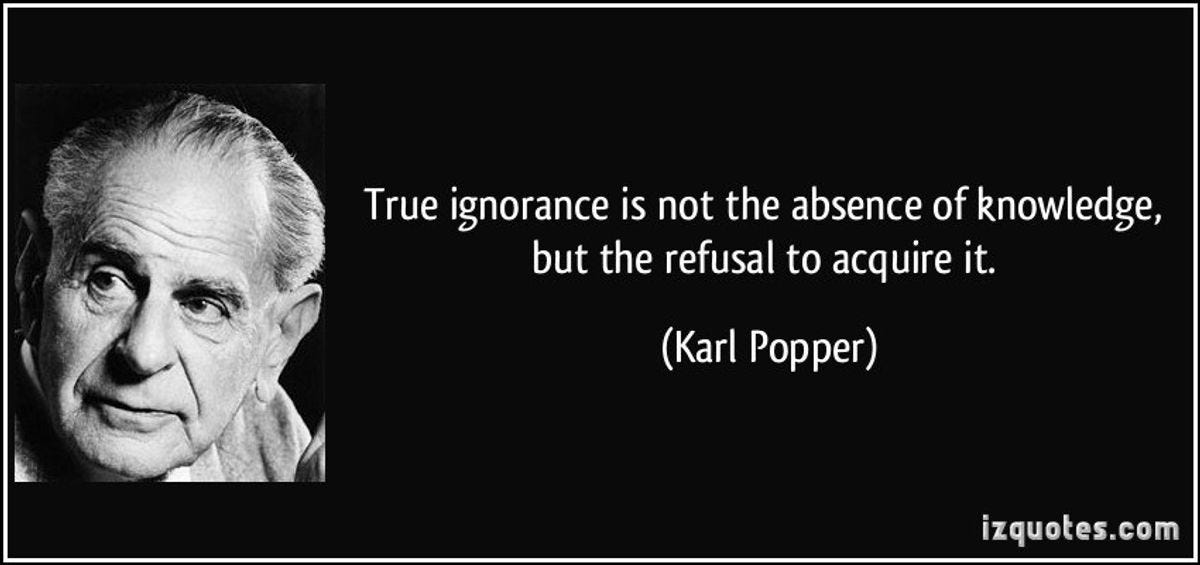The Dichotomy of Ignorance: Navigating between Bliss and Obstacle
Ignorance, a concept often defined as a lack of knowledge or awareness, has been a subject of contemplation throughout human history, provoking diverse perspectives regarding its influence on individuals and society.

Introduction
Ignorance, a concept often defined as a lack of knowledge or awareness, has been a subject of contemplation throughout human history, provoking diverse perspectives regarding its influence on individuals and society. It poses intriguing questions about its effects on our overall way of life. While some proponents argue that ignorance can offer a blissful refuge, shielding us from harsh realities and unnecessary worries, others firmly assert that ignorance presents a significant obstacle, impeding personal growth, societal progress, and the pursuit of truth.
But what precisely is ignorance? In this article, we will delve into the contrasting viewpoints on ignorance and embark on an exploration of its implications in various aspects of life. By examining the multifaceted nature of ignorance, we can gain a deeper understanding of its impact and the intricate interplay between bliss and the obstacles it presents.
I. Understanding Ignorance
Definition of Ignorance: To establish a common understanding, it is crucial to define ignorance and differentiate it from innocence or mere lack of knowledge. Ignorance encompasses willful neglect or rejection of knowledge despite its availability. It goes beyond the absence of information and reflects a conscious decision to remain unaware.
Types of Ignorance: Ignorance manifests in different forms, including individual ignorance, collective ignorance, and both specific subject areas and broader societal issues. By exploring these various types, we can better comprehend the multifaceted nature of ignorance and its implications.
II. Ignorance a Bliss
Shelter from Harsh Realities: Ignorance can serve as a protective shield, guarding individuals from painful truths and alleviating psychological distress. There are instances when being oblivious to certain realities provides a temporary respite, enabling individuals to find solace and contentment in their ignorance, fostering a sense of tranquility.
As the poet William Wordsworth once beautifully penned, "A simple child, that lightly draws its breath, and feels its life in every limb, what should it know of death?" These lines evoke the notion that ignorance, akin to a child's innocence, can offer a respite from the weight of mortality and allow individuals to bask in the purity of existence.
Preservation of Mental Energy: Ignorance enables individuals to conserve their mental energy by filtering out excessive information and cognitive overload. By focusing on what they perceive as essential, individuals can experience increased productivity and enhanced mental well-being.
Consider the case of Sandeep Thambi, a highly ambitious professional immersed in a demanding career. To maintain his focus and drive, Sandeep consciously avoids delving into certain global issues and the complexities of political landscapes. By doing so, he preserves his mental energy and channels it toward his goals, enabling him to achieve a sense of fulfillment and success.
The words of Ralph Waldo Emerson resonate here: "A foolish consistency is the hobgoblin of little minds." Ignorance, when chosen wisely, can be a means of filtering out the noise of the world, allowing individuals to pursue their passions with undivided attention and unwavering determination.
Innocence and Wonder: Ignorance can preserve a childlike sense of wonder, curiosity, and awe. It allows individuals to approach the world with fresh eyes, unencumbered by preconceived notions and biases. This innocence can lead to new discoveries and a greater appreciation for the beauty of the unknown.
The renowned poet Rumi poetically reflects on ignorance and wonder, stating, "Sell your cleverness and buy bewilderment." These words speak to the idea that ignorance when accompanied by a genuine sense of awe and openness, can lead to profound insights and life-changing experiences.
Expanding on these concepts of blissful ignorance we gain a richer understanding of the potential benefits and allure of ignorance. However, it is essential to acknowledge that ignorance, while offering temporary solace, can also hinder personal growth and impede the pursuit of truth. It is this delicate balance that calls for further exploration and contemplation.
III. Ignorance an Obstacle
Stifling Personal Growth: Ignorance poses a significant barrier to personal development, as it hinders individuals from acquiring new knowledge, challenging their beliefs, and expanding their perspectives. It limits their ability to adapt to change and make informed decisions, thereby impeding their journey of growth. Over time, this stagnation and a missed opportunity for growth can have far-reaching consequences.
Meet Ajit, a young professional who remained confined within the boundaries of his comfort zone due to his ignorance. He was reluctant to explore new fields, learn new skills, or challenge his existing beliefs. As a result, he found himself trapped in a monotonous routine, devoid of personal growth and the fulfillment that accompanies it. Only when he embraced knowledge and took risks did Ajit experience the transformative power of personal development.
The words of Maya Angelou echo through the corridors of self-discovery: "I did then what I knew how to do. Now that I know better, I do better." These lines encapsulate the essence of personal growth, emphasizing the importance of knowledge and awareness as catalysts for positive change and personal evolution.
Hindrance to Social Progress: Ignorance fosters prejudice, discrimination, and intolerance, perpetuating stereotypes and deepening divisions within society. Without knowledge and understanding, progress in areas such as equality, justice, and human rights becomes elusive. Combating ignorance becomes imperative for building a more inclusive and compassionate society.
Langston Hughes poetically expressed the need to overcome ignorance in his poem "Harlem," asking, "What happens to a dream deferred? Does it dry up like a raisin in the sun?" This poem serves as a reminder of the detrimental consequences that ignorance can have on societal progress, urging us to confront ignorance to prevent the withering of dreams and aspirations.
Impeding Problem-Solving: Ignorance hampers problem-solving abilities by preventing individuals from understanding the root causes of issues and exploring effective solutions. It perpetuates cycles of ignorance and contributes to the persistence of societal problems. Only by addressing ignorance and seeking knowledge can we break free from this cycle and make meaningful progress.
Let's delve into the story of NoName, a political leader in India, who was determined to tackle the pressing issues of poverty, unemployment, hunger, law and order, and terrorism on Saturn among many others. However, despite his zeal, NoName's approach exemplified the hindrances caused by ignorance. He embarked on a misguided pursuit, believing that all the impoverished needed was the mythical "Jupiter's Velocity" to escape poverty. In a bold but misguided endeavor, he sought to create a machine that would transform potatoes into gold. While his intentions were well-meaning, NoName's ignorance about the root causes of these issues led him astray, diverting his attention from the critical task of identifying the underlying problems and formulating effective solutions. This anecdote highlights the importance of knowledge and understanding in addressing complex societal challenges, emphasizing the need to first comprehend the causes before offering theories and solutions.
The words of Robert Frost resonate here: "Education is the ability to listen to almost anything without losing your temper or your self-confidence." This verse emphasizes the transformative power of education and knowledge in breaking down barriers and fostering a collaborative approach to problem-solving.
By incorporating anecdotes that illustrate the impact of ignorance on personal growth, social progress, and problem-solving, and intertwining the wisdom of poets, we gain a deeper appreciation for the obstacles that ignorance presents. These stories and verses serve as reminders of the urgent need to confront ignorance, seek knowledge, and foster a more enlightened and progressive society.
IV. Striking a Balance: Navigating Ignorance with Wisdom
Promoting Awareness and Education: Overcoming ignorance requires a commitment to lifelong learning and promoting education at all levels. One example of a leader who recognized the transformative power of education is Nelson Mandela, the iconic President of South Africa. Mandela in his journey from being the 'Rolihlahla' to 'Madiba', understood that education was not only a means of personal growth but also a catalyst for societal change. He emphasized the importance of education in dismantling the ignorance that perpetuates inequality aand injustice. Mandela once said, "Education is the most powerful weapon which you can use to change the world." His words inspire us to invest in education, empowering individuals with the knowledge and skills necessary to navigate the complexities of the world.
Embracing Uncertainty: In the realm of uncertainty, leaders such as Sir Winston Churchill come to mind. As the Prime Minister of the United Kingdom during World War II, Churchill grappled with immense uncertainty and made crucial decisions that shaped history. His leadership was marked by an acceptance of uncertainty, acknowledging that despite the limitations of knowledge, one must act with courage and conviction. Churchill's famous words, "Success is not final, failure is not fatal: It is the courage to continue that counts," reflect his willingness to embrace uncertainty while remaining steadfast in the pursuit of truth and progress.
Cultivating Empathy and Open-mindedness: Leaders who embody empathy and open-mindedness serve as beacons of enlightenment in the face of ignorance. One such leader is Dr. A.P.J. Abdul Kalam, Poet, Author, Scientist, Teacher, the former President of India. Known as the "People's President," Kalam's leadership style was characterized by his empathy and open-mindedness towards the diverse perspectives and aspirations of the Indian people.
Dr. Kalam's journey from a humble background to becoming one of India's most respected scientists and revered leaders fostered a deep sense of empathy within him. He understood the challenges faced by individuals from marginalized communities and strived to uplift them through education and empowerment. Kalam's interactions with students, especially during his presidency, exemplified his empathy and genuine concern for their well-being, inspiring countless young minds to pursue their dreams.
In addition to empathy, Dr. Kalam possessed an open-minded approach that allowed him to embrace ideas from various sources and backgrounds. He encouraged innovation, scientific temperament, and critical thinking, recognizing that progress and knowledge emerge from diverse perspectives. Kalam was known for engaging with students, scientists, and thinkers from all walks of life, actively seeking to broaden his own understanding and foster an environment conducive to the pursuit of knowledge.
In the words of Maya Angelou: "Ignorance, allied with power, is the most ferocious enemy justice can have." These lines underscore the significance of knowledge in the pursuit of justice and the imperative of combating ignorance in positions of power.
Rumi, the renowned poet, and mystic, offers his insights: "Be kind to yourself, dear - to our innocent follies. Forget any sounds or touch you knew that did not help you dance." These verses encourage us to cultivate self-compassion and embrace our journey of learning, shedding the shackles of ignorance that hinder our growth.
Dr. Kalam's famous words, "Dream, dream, dream. Dreams transform into thoughts and thoughts result in action," encapsulate his open-mindedness and his belief in the power of dreams and ideas. He encouraged individuals to dare to dream, to think beyond limitations and conventions, and to pursue knowledge and innovation.
And this is where I leave you, in the company of leaders such as Nelson Mandela, Winston Churchill, and APJ Abdul Kalam, coupled with the wisdom of poets like Maya Angelou, Langston Hughes, Ralph Walden, and Rumi, to remind us of the importance of promoting awareness, embracing uncertainty, and cultivating empathy and open-mindedness.
By drawing inspiration from these real-world leaders and weaving in the beauty of poetry, we are encouraged to navigate the delicate balance between ignorance and wisdom, ultimately fostering a society that values knowledge, understanding, and compassion.
V. Conclusion:
There is None.
It is up to you, you are the writer of your story, end it the way you like.
Godspeed.

